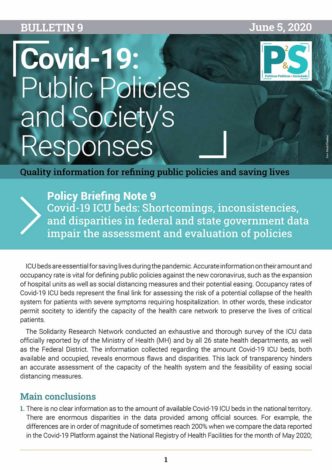ICU beds are essential for saving lives during the pandemic. Accurate information on their amount and occupancy rate is vital for defining public policies against the new coronavirus, such as the expansion of hospital units as well as social distancing measures and their potential easing. Occupancy rates of Covid-19 ICU beds represent the final link in the potential collapse of the health system for patients in severe clinical conditions. In other words, they ultimately allow us to identify the capacity of the health care network to preserve the lives of critical patients.
The Solidarity Research Network conducted an exhaustive and thorough survey of the ICU data recorded on the public platforms of the Ministry of Health (MH) and in all 26 state health departments, as well as the Distrito Federal. The information collected regarding the amount Covid-19 ICU beds, both available and occupied, presents enormous flaws and disparities. This lack of transparency hinders an accurate assessment of the capacity of the health system and the feasibility of easing the currently underway social distancing measures.
Main conclusions
- There is no clear information as to the amount of available Covid-19 ICU beds in the national territory. There are enormous disparities in the data provided on the official platforms, which sometimes reach 200% when we compare the Covid-19 Platform records against the National Register of Health Facilities for the month of May 2020;
- Two Brazilian states, Rio de Janeiro and Tocantins, did not provide any information on the number of Covid-19 ICU beds on their platforms, with Rio de Janeiro ranking among the top 5 Brazilian states with the highest death rate from the new coronavirus so far;
- Only 5 states provide the number of Covid-19 ICU beds in the SUS1 as well as in the private system: Alagoas, Ceará, Distrito Federal, Espírito Santo, and Sergipe;
- Only 7 states provide the real-time occupancy rate of Covid-19 ICU beds in the SUS across all units managed by the State Secretariats: Alagoas, Ceará, Distrito Federal, Espírito Santo, Goiás, Santa Catarina, and Sergipe;
- States considered epicenters of the pandemic in Brazil, such as Amazonas and São Paulo, lack information about Covid-19 ICU beds. The Amazonas platform provides only the number of occupied beds, which does not allow us to estimate the occupancy rate. São Paulo provides only the occupancy rate of Covid-19 ICU beds without differentiating between the SUS and the private network;
- Different arrangements have been adopted by public managers to increase the number of ICU beds during the pandemic, such as increasing the amount of beds contracted from private hospitals and health networks as well as the creation of field hospitals, with the acquisition of new equipment and materials. Given the scarce data currently available on public access platforms, we are unable to verify which actions were taken by the states, nor the cost and effectiveness of the acquisitions;
- The generalized inconsistency of the data on ICUs suggests that the synergies between the public and private health systems are not being fully explored. Furthermore, they raise significant doubts as to the efficiency of the currently implemented policies.
- If governments use the information disclosed to the public as a significant reference point, then we must be alert to the severe mismatch between the data, the estimates of the capacity to care for patients in acute conditions, and the ongoing plans for easing social distancing measures.
- If the data provided is not sufficiently robust to ground the crisis containment policies, the population will be oriented to follow decisions based on unknown sources of information or known only to governments. In both alternatives, the population’s understanding, judgment, and adherence are impaired.
- The lack of information for the public is severely damaging, with negative implications for the health care of both those contaminated by Covid-19 and the continuity of continuous treatments for other diseases.
Work group responsible
Coordination: Tatiane C. Moraes de Sousa (Fiocruz), José Eduardo Krieger (Incor-FMUSP) e Lorena Barberia (USP).
Researchers:
- Luciana Sarmento Garbayo (University of Central Florida)
- Mariane T. de Vasconcelos Caetano (master’s student, Fiocruz/PE – Instituto Aggeu Magalhães)
- Renata Breves (PhD student, PPGBIOS/Fiocruz)
- Pedro Schmalz (undergraduate student, Social Sciences/USP)


